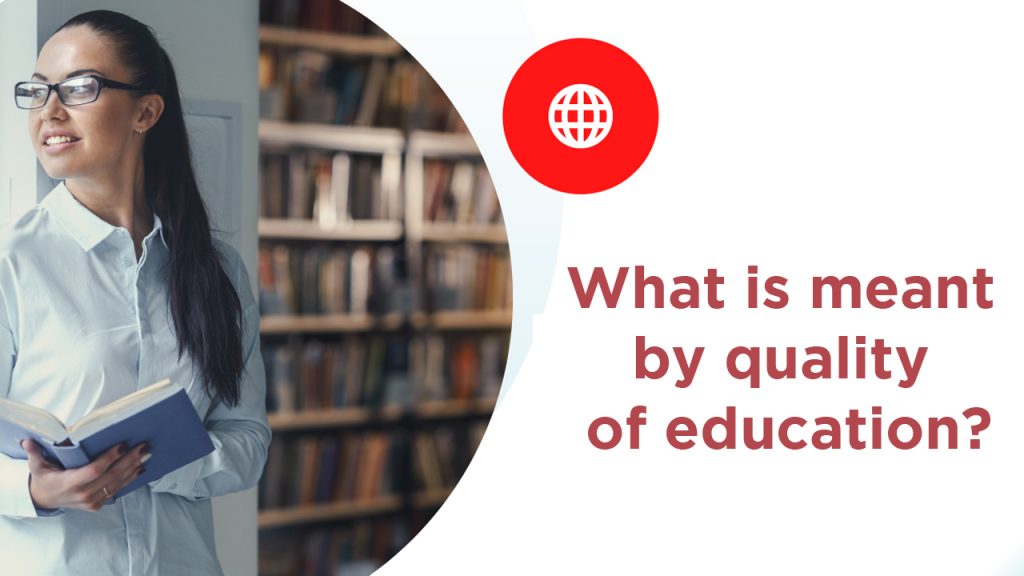In today’s competitive world, the quality of education plays a pivotal role in shaping the future of individuals and societies. But what exactly is meant by the quality of education? Is it merely about acquiring knowledge or does it encompass more?

Defining Quality of Education
Quality of education refers to the overall effectiveness of the learning process, where the emphasis is not just on rote memorization but on nurturing critical thinking, problem-solving skills, and personal development. It goes beyond traditional metrics like test scores and graduation rates, focusing on the holistic growth of students.
Quality education is about creating an environment that encourages active learning, where students are actively engaged in the process and are able to apply their knowledge to real-world situations. It is about equipping students with the skills and attitudes necessary to succeed in a rapidly changing world.
Importance of Quality Education
The importance of quality education cannot be overstated. It is the foundation upon which individuals build their careers, pursue their passions, and contribute to society. Quality education empowers individuals to become critical thinkers, lifelong learners, and active participants in their communities.
A quality education not only enhances a person’s employability but also improves their overall well-being. It provides individuals with the necessary tools to navigate the complexities of life, make informed decisions, and lead fulfilling lives. Moreover, quality education has a ripple effect, positively impacting families, communities, and societies as a whole.
Factors that Contribute to Quality Education
Several factors contribute to the quality of education. Firstly, qualified and motivated teachers are essential. Teachers who are knowledgeable, passionate, and skilled in their subject matter can inspire students, cultivate their love for learning, and create a positive learning environment.
Secondly, the curriculum and teaching methods should be designed to promote critical thinking, creativity, and problem-solving skills. A well-designed curriculum takes into account the needs and interests of students, ensuring that learning is relevant, engaging, and meaningful.
Infrastructure and resources also play a crucial role in providing quality education. Adequate facilities, including classrooms, libraries, laboratories, and technology, enable effective teaching and learning. Access to educational resources, such as textbooks, digital content, and internet connectivity, is equally important in today’s digital age.
Lastly, parental involvement and community engagement contribute to quality education. When parents are actively involved in their child’s education, supporting and reinforcing learning at home, it enhances the overall educational experience. Collaboration between schools and communities can also lead to innovative programs, resources, and opportunities for students.
Evaluating the Quality of Education
Evaluating the quality of education is essential to ensure that students are receiving the best possible education. Traditional metrics like test scores and graduation rates provide some insights but do not paint the whole picture. A comprehensive evaluation should consider multiple dimensions, including academic achievement, critical thinking skills, social and emotional development, and student satisfaction.
Standardized tests can be a useful tool for measuring academic performance, but they should not be the sole determinant of quality education. Other assessment methods, such as project-based assessments, portfolios, and peer evaluations, can provide a more holistic view of a student’s capabilities.
Additionally, feedback from students, parents, and teachers can offer valuable insights into the effectiveness of the learning process. Surveys, focus groups, and interviews can help identify areas for improvement and ensure that the educational experience is meeting the needs of all stakeholders.

Photo by astize on Pixabay
Challenges in Ensuring Quality Education
Ensuring quality education is not without its challenges. One of the primary challenges is the lack of access to education, particularly in disadvantaged communities and developing countries. Limited resources, inadequate infrastructure, and cultural barriers often prevent children from receiving a quality education.
Another challenge is the achievement gap, where certain groups of students, such as those from low-income backgrounds or marginalized communities, face significant disparities in educational outcomes. Addressing this gap requires targeted interventions, including equitable funding, tailored support, and inclusive policies.
The rapid pace of technological advancements presents both opportunities and challenges in ensuring quality education. While technology can enhance learning experiences and provide access to educational resources, it also requires teachers to adapt their teaching methods and students to develop digital literacy skills.
Initiatives to Improve the Quality of Education
Recognizing the importance of quality education, numerous initiatives have been launched to improve educational outcomes worldwide. These initiatives focus on various aspects, including teacher training, curriculum development, infrastructure improvement, and community engagement.
Professional development programs for teachers aim to enhance their pedagogical skills, subject knowledge, and digital literacy. By equipping teachers with the necessary tools and support, these programs empower them to deliver high-quality instruction and engage students effectively.
Curriculum reforms aim to make education more relevant and responsive to the needs of students and society. They encourage the integration of critical thinking, problem-solving, and life skills into the curriculum, ensuring that students are prepared for the challenges of the 21st century.
Investments in infrastructure, such as building schools, providing adequate facilities, and improving access to technology, are crucial in creating an enabling environment for quality education. Governments and organizations around the world are working towards bridging the digital divide and ensuring that all students have equal opportunities to learn and thrive.
Community engagement initiatives seek to involve parents, local leaders, and organizations in the education process. By fostering partnerships between schools and communities, these initiatives create a supportive ecosystem that enhances student learning and well-being.
The Role of Teachers in Delivering Quality Education
Teachers play a vital role in delivering quality education. They are not just disseminators of knowledge but also mentors, facilitators, and role models for students. Quality education is impossible without dedicated and skilled teachers who are passionate about their profession and committed to the success of their students.
Teachers create a positive classroom environment where students feel safe, respected, and motivated to learn. They employ effective teaching strategies, such as active learning, cooperative learning, and differentiated instruction, to cater to the diverse needs of students.
A quality teacher-student relationship is essential for effective learning. Teachers who establish strong relationships with their students can better understand their strengths, challenges, and learning styles, enabling them to provide personalized support and guidance.
Continuous professional development is crucial for teachers to stay updated with the latest research, teaching methodologies, and technologies. By continuously improving their skills and knowledge, teachers can deliver high-quality instruction and create meaningful learning experiences for their students.
Impact of Quality Education on Society
The impact of quality education extends beyond the individual level, shaping societies and fostering progress. Quality education equips individuals with the knowledge, skills, and attitudes necessary to thrive in an ever-evolving world. It empowers them to become active contributors to society, driving innovation, and bringing positive change.
Societies that prioritize quality education benefit from a skilled and educated workforce, leading to economic growth and social development. Quality education also promotes social cohesion, tolerance, and mutual understanding, fostering peaceful coexistence and reducing conflicts.
Quality education is a catalyst for sustainable development. It equips individuals with the knowledge and awareness to address pressing global challenges, such as climate change, poverty, and inequality. By promoting sustainable practices and responsible citizenship, quality education contributes to a more sustainable and equitable future.
Investing in Quality Education for a Brighter Future
Investing in quality education is crucial for individuals, societies, and the world at large. It is a powerful tool that can transform lives, break the cycle of poverty, and create a more equitable and prosperous future. Quality education goes beyond imparting knowledge; it nurtures critical thinking, creativity, and personal development.
To ensure quality education for all, stakeholders must work together to overcome challenges, improve infrastructure, and empower teachers. Governments, policymakers, educators, parents, and communities must collaborate to create an inclusive and supportive learning environment that enables every individual to reach their full potential.
By investing in quality education today, we are investing in a brighter future for generations to come. Let us strive for a world where every individual has access to a quality education, empowering them to lead fulfilling lives and make a positive impact on society.




